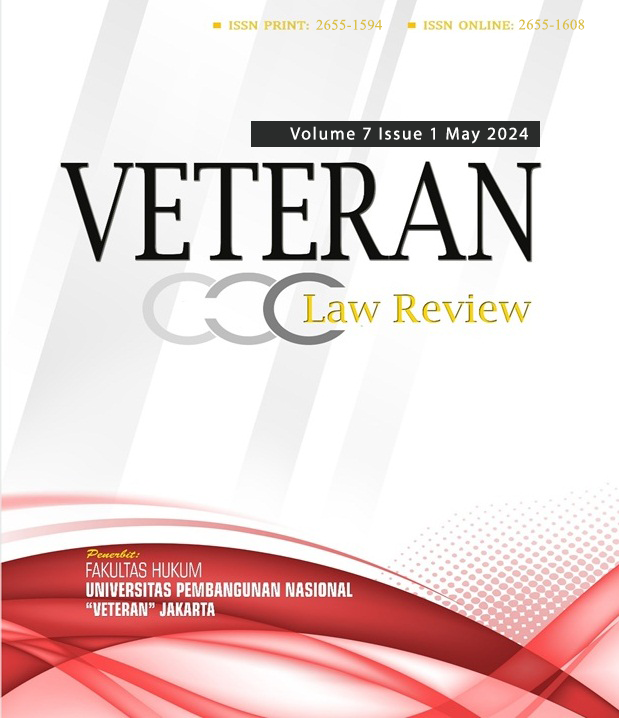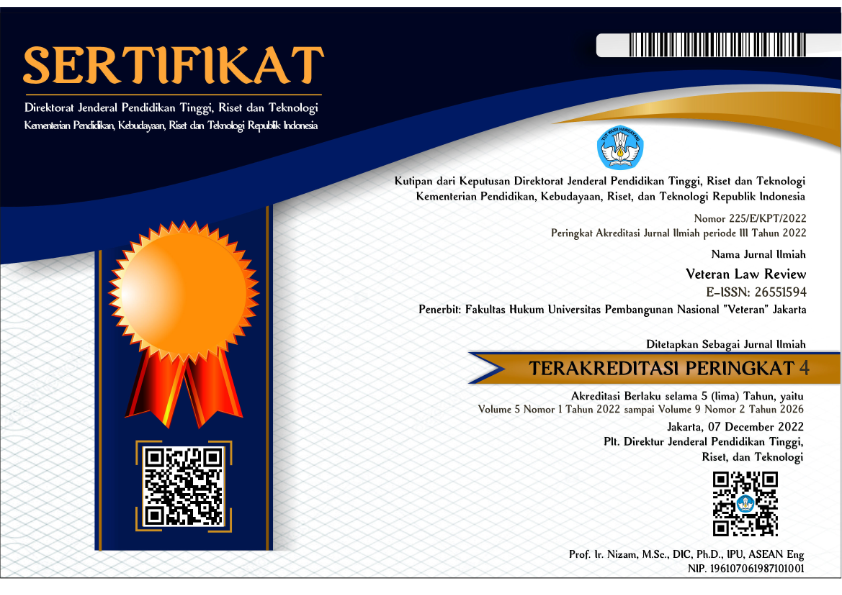Criminal Law Politics of Rechterlijk Pardon Concept
(Comparative Study the New Criminal Code and Juvenile Justice System Law)
DOI:
https://doi.org/10.35586/velrev.v7i1.6606Keywords:
Criminal Law Politics; Rechterlijk Pardon; Criminal Code; Juvenile Justice System.Abstract
The original Indonesian version of legal identity that was born from the soul of the Indonesian nation has been camouflaged by the hegemony of western legal thought that tends to be legalistic, formalistic and liberal in spirit. Therefore, it is time to purify the national legal identity by reforming the law. One form of legal reform is carried out by the state through the reform of criminal law, namely the New Criminal Code which regulates the concept of judge forgiveness (Rechterlijk Pardon) to undermine the character of colonial legacy criminal law which is rigid and not in accordance with the legal needs of society. On that basis, this research aims to review and analyze the comparison of the regulation of the concept of Rechterlijk Pardon in the Criminal Code and the SPPA Law which also regulates Rechterlijk Pardon and analyze the political construction of criminal law in updating the regulation of Rechterlijk Pardon in the New Criminal Code. This research is a normative legal research (doctrinal). The results of this study indicate that Article 70 of the SPPA Law provides options for judges with two things, namely not imposing punishment or imposing measures. Meanwhile, the concept of Rechterlijk Pardon in Article 54 paragraph (2) of the New Criminal Code is that the judge can actually consider not imposing either punishment or action, which of course shows a difference. Furthermore, the political construction of criminal law of Rechterlijk Pardon in philosophical, sociological and legal considerations is that Rechterlijk Pardon is motivated by the need to reconstruction the understanding of judges to impose punishment by looking at the severity of the offender action as well as aspects of the needs of society values of justice.
Downloads
References
Achmad, Ruben. (2017). “Hakekat Keberadaan Sanksi Pidana Dan Pemidanaan Dalam Sistem Hukum Pidana”. Legalitas: Jurnal Hukum. 5 (2). 79–104.
Barlian, Aristo Evandy A, dan Barda Nawawi Arief. (2017). “Formulasi Ide Permaafan Hakim (Rechterlijk Pardon) dalam Pembaharuan Sistem Pemidanaan di Indonesia”. Jurnal Law Reform. 13 (1). 28–44.
Dewi, Putu Mery Lusyana, dan I Ketut Rai Setiabudhi. (2020). “Kebijakan Formulasi Rechterlijk Pardon (Pemaafan Hakim) Dalam RKUHP”. Jurnal Kertha Wicara. 9 (9) 1–18.
Farikhah, Mufatikhatul. (2018). “Konsep Judicial Pardon (Pemaafan Hakim) dalam Masyarakat Adat di Indonesia”. Jurnal Hukum Media. 25 (1). 81–92.
Firdaus, Salman Nazil, Nella Sumika Putri, dan Rully Herdita Ramadhani. (2021). “Pembelaan Terpaksa dalam Perkara Penganiayaan yang Menyebabkan Kematian Oleh Anak.” Jurnal Kertha Semaya. 9 (4). 671–691.
Hakim, Lukman. (2019). “Penerapan Konsep ‘Pemaafan Hakim’sebagai Alternatif dalam Menurunkan Tingkat Kriminalitas di Indonesia”. Jurnal Keamanan Nasional. 5 (2). 185–202.
Kurniawan, Teguh, Adelina Mariani Sihombing, dan Aurelia Berliane. (2023). “Konstruksi Politik Hukum Pidana Terhadap Delik Perzinaan Dalam Rancangan Kitab Undang-Undang Hukum Pidana”. Jurnal Bina Mulia Hukum. 12 (1). 11–24.
Rohayati, Dewi. (2016). “Pengaturan Yudisial Pardon dalam Pembaharuan Hukum Pidana Indonesia”. Wacana Paramarta: Jurnal Ilmu Hukum. 15 (2). 1–15.
Rosana, Ellya. (2014). “Kepatuhan Hukum sebagai Wujud Kesadaran Hukum Masyarakat”. Jurnal Tapis: Jurnal Teropong Aspirasi Politik Islam. 10 (1). 61–84.
Saputro, Adery Ardhan. (2016). “Konsepsi Rechterlijk Pardon Atau Pemaafan Hakim dalam Rancangan KUHP”. Jurnal Mimbar Hukum. 28 (1). 61–76.
Firmansyah, Adithya Tri, Anwar Cengkeng, dan Sirajuddin. (2021). “Rekonstruksi Pengujian Kembali terhadap Putusan Pengujian Undang-Undang di Mahkamah Konstitusi Untuk Meminimalisir Dampak Sifat Putusan yang Final dan Mengikat.” Conference on Innovation and Application of Science and Technology (CIASTECH). 133–142.
Arief, Barda Nawawi. (2005). Pembaharuan Hukum Pidana dalam Perspektif Kajian Perbandingan. Semarang: Badan Penerbit Universitas Diponegoro.
Mahfud, Moh. (2010). Membangun Politik Hukum, Menegakkan Konstitusi. Jakarta: PT. Raja Grafindo Persada.
Mahmud Marzuki, Peter. (2008). Pengantar Ilmu Hukum. Jakarta: Kencana Prenada Media Group.
------------------------. (2010). Penelitian Hukum. Jakarta: Kencana Prenada Media Group.
Maroni. (2016). Pengantar Politik Hukum Pidana. Lampung: Aura.
Mertokusumo, Sudikno. (2014). Penemuan Hukum. Yogyakarta: Cahaya Atma.
Prasetyo, Teguh. (2013). Hukum dan Sistem Hukum Berdasarkan Pancasila. Yogyakarta: Media Perkasa.
Rahardjo, Satjipto. (2006). Membedah Hukum Progresif. Jakarta: Kompas.
------------------------. (2000). Ilmu Hukum, Bandung: PT. Bandung: PT. Citra Aditya Bakti.
Zaidan, M Ali. (2015). Menuju Pembaruan Hukum Pidana. Jakarta: Sinar Grafika.
Perundang-undangan:
Undang-undang Dasar Negara Republik Indonesia Tahun 1945.
Undang-undang Republik Indonesia Nomor 1 Tahun 2003 tentang Kitab Undang-Undang Hukum Pidana.
Undang-undang Republik Indonesia Nomor 11 Tahun 2012 tentang Sistem Peradilan Pidana Anak.
Downloads
Published
How to Cite
Issue
Section
License
Copyright (c) 2024 Veteran Law Review

This work is licensed under a Creative Commons Attribution-ShareAlike 4.0 International License.
Copyright (c) 2022 Veteran Law Review Journal
Veteran Law Review © 2022 by Faculty of Law Universitas Pembangunan Nasional "Veteran" Jakarta is licensed under Creative Commons Attribution 4.0 International

1. License
The non-commercial use of the article will be governed by the Creative Commons Attribution license as currently displayed on Creative Commons Attribution 4.0 International.
2. Author(s)' Warranties
The author warrants that the article is original, written by the stated author(s), has not been published before, contains no unlawful statements, does not infringe the rights of others, is subject to copyright that is vested exclusively in the author, and free of any third party rights, and that any necessary written permissions to quote from other sources have been obtained by the author(s).
3. User/Public Rights
VELREV's spirit is to disseminate articles published are as free as possible. Under the Creative Commons Attribution-ShareAlike 4.0 International License. VELREV permits users to copy, distribute, display, and perform the work for non-commercial purposes only. Users will also need to attribute authors and VELREV to distributing works in the journal and other media of publications.
4. Rights of Authors
Authors retain all their rights to the published works, such as (but not limited to) the following rights;
- Reproduce the work
- Prepare derivative works based upon the work
- Distribute copies of the work
- Perform the work publicly
- Display the work publicly
- Copyright and other proprietary rights relating to the article, such as patent rights,
- The right to self-archive the article,
- The right to enter into separate, additional contractual arrangements for the non-exclusive distribution of the article's published version (e.g., post it to an institutional repository or publish it in a book), with an acknowledgement of its initial publication in this journal (Veteran Law Review).
5. Co-Authorship
If the article was jointly prepared by more than one author, any author submitting the manuscript warrants that he/she has been authorized by all co-authors to be agreed on this copyright and license notice (agreement) on their behalf, and agrees to inform his/her co-authors of the terms of this policy. VELREV will not be held liable for anything that may arise due to the author's internal dispute. VELREV will only communicate with the corresponding author.
6. Royalties
Being an open accessed journal and disseminating articles for free under the Creative Commons license term mentioned, author(s) are aware that VELREV entitles the author(s) to no royalties or other fees.
7. Miscellaneous
VELREV will publish the article (or have it published) in the journal if the article’s editorial process is successfully completed. JOSI's editors may modify the article to a style of punctuation, spelling, capitalization, referencing, and usage that deems appropriate. The author acknowledges that the article may be published so that it will be publicly accessible and such access will be free of charge for the readers as mentioned in point 3.


















